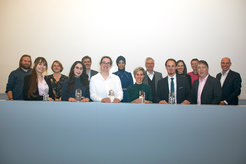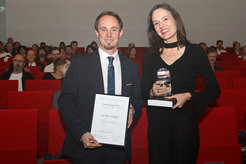The Mülheim Chemistry Campus honors early career scientists with Ernst Haage Awards
The symposium highlighted concepts of sustainable chemistry and exceptional scientific talents
Students who decide to pursue a scientific career often have big plans: achieving a Master's degree, pursuing a doctorate, studying at a renowned university abroad and establishing their own exciting field of research. These are the goals that bring many early career chemists from all over the world to one of the two Max Planck Institutes in Mülheim. To be successful, ambition, enthusiasm for the natural sciences and the will to dive deep into detail is needed. At this year's Ernst Haage Symposium, promising talents were honored and concepts for sustainable chemistry were discussed.

The symposium started with one of the pioneers of "Green Chemistry", Professor Paul Anastas from Yale University. In his key note lecture, he presented his approach to environmentally friendly chemistry. Anastas proposed rethinking our standard approaches to industrial production and instead calls for effective, sustainable chemical production processes. With his credo “From efficiency to effectiveness” he suggests that instead of just wanting to make every production step and every product more and more efficient, there needs to be a switch to a holistic concept of effectiveness that considers resource conservation and CO2 minimization from the outset. His co-speaker Stafford Sheehan, visionary entrepreneur and co-founder of the Air Company (New York, USA), presented how sustainable chemistry can work in real production processes. His company utilizes CO2 emissions to manufacture climate-friendly products. Captured CO2 could, for example, be used to produce carbon-negative alcohols and fragrances and thus even enable production of luxury goods. Carbon capture processes could help to reduce CO2 emissions by 10 per cent annually, Sheehan pointed out and underlined that environmental friendly processes like these would require efficient heterogeneous catalysts.
Ernst Haage Award winners are enthusiastic about catalysis
The research of Ernst Haage Prize winner Dr. Joyce Grimm focuses on the synthesis of natural products, which are in high demand for medical and industrial applications: menthol and cannabinoids. The Ph.D. researcher from Professor Benjamin List's Department of Homogeneous Catalysis at the Max-Planck-Institut für Kohlenforschung has found a very efficient way to synthesize the complex molecule from Neral using selective asymmetric organocatalysis. The new method saves several synthesis steps and was long regarded as a "desired reaction" in chemistry. The new pathway demonstrated by Dr. Grimm is extremely interesting for industrial applications, and the importance of her scientific advances were recognized by both her doctoral supervisor, Ben List, as well as the Board of Trustees of the Ernst Haage Foundation.
Dr. Maria Drosou from the Department of Molecular Chemistry and Spectroscopy at the MPI für Kohlenforschung also received the Ernst Haage Prize for PhD students and postdoctoral researchers. Dr. Drosou is working in the group of Dr. Dimitrios Pantazis (in the Department of Prof. Frank Neese) in the field of photosynthesis and water splitting. She took a rather unusual pathway to theoretical chemistry: After a promising career in competitive sailing, she decided to take up a career in chemistry. After an initial working period in industry, she was attracted by research and immersed herself in the depths of molecules. In his laudatio, her supervisor reported that Drousou quickly made outstanding contributions and thus became an indispensable member of the group. Dr. Drosou is also the recipient of an Alexander von Humboldt Research Fellowship and is dedicated to uncovering the catalytic principles of photosynthetic water oxidation with the help of quantum chemistry.

Mesoporous materials and their efficient molecular structure were the focus of the lecture by Dr. Oliver Dumele, this year’s Ernst Haage national prize winner. Dr. Dumele until recently headed a lab at the Humboldt University in Berlin and stands out not only through his excellent research on layered and macrocyclic materials, but also as an outstanding mentor for his team. "He inspires young researchers to take on responsibility," said Stefan Hecht praising him. Dr. Oliver Dumele received a certificate as well a monetrary award from the foundation, presented by Professor Serena DeBeer. His award lecture was warmly received by the guests of the symposium.
The training of apprentices is a matter close to the heart of the Ernst Haage-Foundation
Ernst Haage, who was associated with the Mülheim Chemistry Campus in his early career, always attached great importance to the training of young people. For this reason, a prize for apprentices is also awarded at the Ernst Haage Symposium. The chemical laboratory assistants Berfin Göker from the Kohlenforschung and Sandra Denner from the MPI for Chemical Energy Conversion received this year’s award and high praise from their supervisors.
"The Ernst Haage Prizes should be an incentive for the award winners on their future career path and give them confirmation that their diligence and curiosity are worthwhile," explained Serena DeBeer. “A look back over the last 15 years shows that many of the previous prize winners have reached their goals. We are very proud to see that many of our Ernst Haage awardees are now professors at renowned universities". Dr. Oliver Dumele continues the trajectory of previous prize winners having just started a W3 professorship at the Albert Ludwig’s University in Freiburg.
About the Ernst Haage Foundation
Ernst Haage started out as an apprentice in precision mechanics, built up his technical knowledge and took over the management of the workshop. Ernst Haage worked for many years as head of precision mechanics at the Mülheim campus and then founded a successful company. After his death, his daughter, Ursula Bonnen, set up a foundation to promote early career scientists in the field of chemistry. The prize is aimed at outstanding early career researchers in Germany who have not yet found a permanent position.
Since the first awarding of the Ernst Haage Prize in 2006, 19 national prizes, 12 Ernst Haage Prizes for doctoral students/postdocs and 20 prizes for apprentices of the Mülheim MPI have been awarded.

